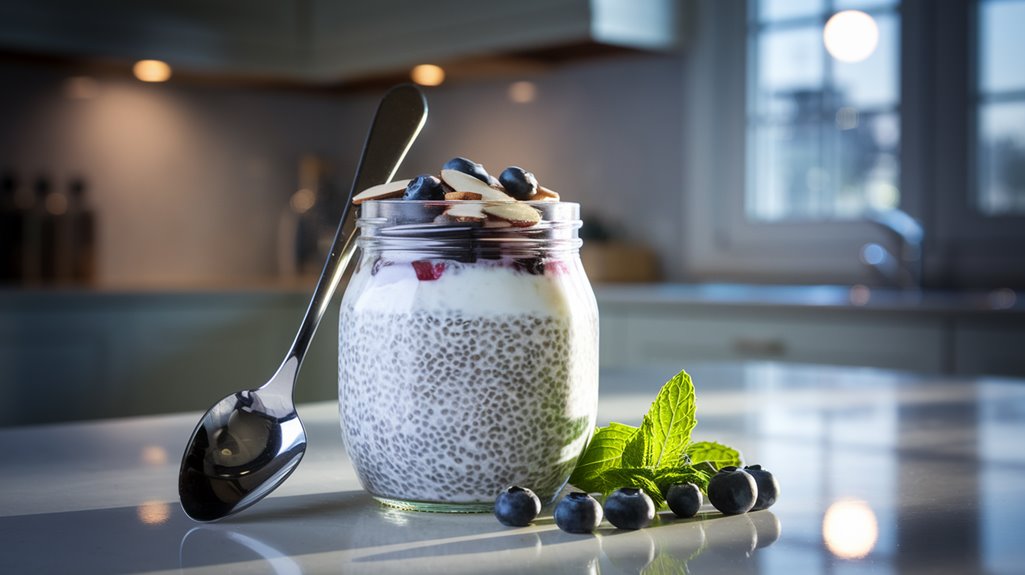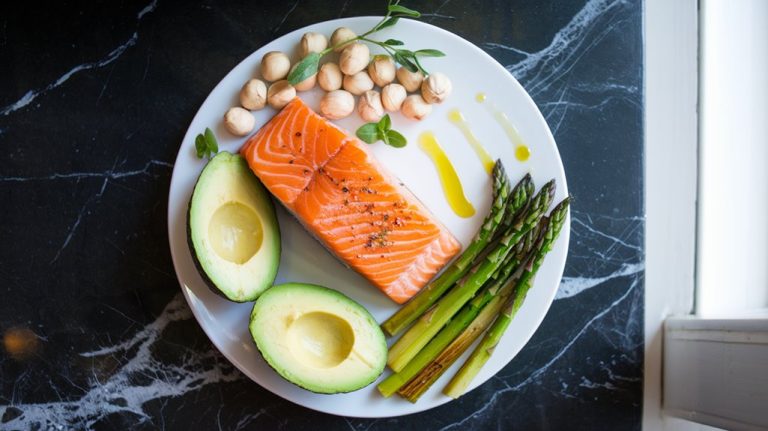Your late-night cravings stem from natural hormonal shifts that peak between midnight and 2 AM, when ghrelin rises and leptin drops. You can combat these urges by following a ketogenic approach of 20-50g carbs daily while timing your last meal 2-3 hours before bed. Combining this with strategic meal planning, mindful eating techniques, and quality sleep between 10 PM and 2 AM helps reset your appetite signals. Understanding these biological rhythms reveals the key to conquering nighttime hunger.
Keto Highlights
- Restrict daily carbohydrates to 20-50g while increasing healthy fats to 60-75% of calories to maintain ketosis and reduce nighttime cravings.
- Consume 25-30g protein at each meal and space three balanced meals throughout the day to maximize satiety and prevent late-night hunger.
- Allow 2-3 hours between final meal and bedtime, ideally eating dinner between 7-7:30 PM for optimal metabolic efficiency.
- Track blood ketone levels between 0.5-3.0 mmol/L and incorporate MCT oil to enhance ketone production and suppress appetite.
- Practice mindful eating and keep protein-rich keto snacks accessible for emergency hunger, while storing tempting foods in less visible locations.
The Science Behind Midnight Hunger Pangs
While many people struggle with late-night food cravings, these urges aren't simply a matter of willpower – they're rooted in complex biological processes. Your body's circadian rhythm orchestrates a delicate dance of hormones that influence hunger and satiety throughout the day. As evening approaches, ghrelin levels peak while leptin decreases, creating a perfect storm for increased appetite.
Your insulin sensitivity naturally declines at night, while melatonin production can trigger carbohydrate cravings. If you're not getting adequate nutrition during the day, your blood sugar may fluctuate, intensifying these late-night urges. The brain's reduced reward response to food during nighttime hours can also lead to overconsumption as you attempt to achieve satisfaction. Understanding these biological mechanisms is essential for developing effective strategies to manage midnight hunger pangs.
Mastering Ketosis for Overnight Success
For those battling late-night cravings, ketosis offers a powerful metabolic solution. You'll need to restrict carbs to 20-50g daily while increasing healthy fats to 60-75% of your calories. Track your blood ketone levels, aiming for 0.5-3.0 mmol/L using a reliable meter.
To optimize your overnight success, focus on electrolyte balance and incorporate MCT oil for efficient ketone production. Choose nutrient-dense foods like spinach, fatty fish, and grass-fed meats. Combat initial adaptation symptoms by staying hydrated and supplementing with essential minerals.
You'll enhance ketosis through intermittent fasting, particularly the 16/8 method. Combine this with high-intensity exercise to deplete glycogen stores effectively. Monitor your progress through regular body composition assessments and adjust your macronutrient ratios based on your individual response.
Strategic Meal Planning to Combat Late Cravings
To successfully combat late-night cravings, strategic meal planning plays a critical role in stabilizing your blood sugar and regulating hunger hormones throughout the day. Research shows that structured eating patterns, combined with ideal nutrient composition, can reduce nighttime cravings by up to 60%.
Your daily meal strategy should include:
- Consuming 25-30g protein at each meal to maximize satiety
- Spacing 3 balanced meals plus 1-2 planned snacks throughout the day
- Including fiber-rich whole foods while limiting processed ingredients
- Planning treats at specific times to redirect spontaneous cravings
Don't skip breakfast – studies link morning meals to reduced obesity risk. Prepare healthy alternatives in advance and document your intake to identify triggering patterns. Remember to allow 2-3 hours between your final meal and bedtime for ideal digestion.
Sleep Quality and Hunger Hormone Balance
Your sleep cycles directly control ghrelin and leptin, two key hormones that regulate hunger and satiety throughout the day. When you're sleep-deprived, your ghrelin levels surge by 28% while leptin drops by up to 19%, creating an imbalance that intensifies cravings and disrupts your body's natural appetite signals. You'll find that improving your sleep quality can help reset this hormonal clock, as maintaining consistent sleep patterns aligns with your circadian rhythm and supports better metabolic function.
Sleep Cycles Impact Cravings
While you might blame willpower for those late-night food cravings, your sleep patterns play an essential role in regulating hunger hormones. When your circadian rhythm gets disrupted, it triggers a cascade of hormonal changes that intensify your desire for high-calorie foods, especially during nighttime hours.
Your sleep-wake cycle directly influences your eating behavior through:
- Ghrelin levels increase by up to 30% when you're sleep-deprived, amplifying hunger signals
- Leptin production drops by 6% for each hour of lost sleep, reducing satiety
- Your olfactory sensitivity heightens, making food aromas more enticing
- Endocannabinoid production rises, increasing your appetite for energy-dense foods
Understanding these biological mechanisms reveals why quality sleep is vital for managing late-night cravings and maintaining healthy eating patterns.
Reset Your Hormonal Clock
Since hormonal balance plays an essential role in regulating hunger and satiety, resetting your body's internal clock can greatly improve control over late-night cravings. To optimize your hormonal rhythm, you'll need to align your sleep schedule with your body's natural circadian patterns. Research shows that sleeping between 10 PM and 2 AM maximizes beneficial hormonal secretions, particularly melatonin and leptin, which help suppress nighttime hunger.
Start by eating breakfast within an hour of waking to regulate metabolism, incorporating protein, healthy fats, and fiber-rich carbohydrates. Gradually shift your bedtime toward 10:00-10:30 PM and maintain consistent sleep-wake cycles. Avoid large meals close to bedtime, as late eating correlates with higher body fat percentage and disrupted hormone patterns. These evidence-based adjustments can help reestablish your body's natural hormonal balance and reduce unwanted nighttime eating.
Pre-Bedtime Workout Strategies

Whether you're struggling with late-night cravings or restlessness, incorporating strategic pre-bedtime workouts can help regulate your sleep cycle and curb nighttime hunger. Studies show that moderate-intensity exercises performed one hour before bedtime can improve sleep quality without disrupting your rest patterns.
For best results, consider these evidence-based workout strategies:
- Start with low-impact exercises like wall squats and knee raises, holding each position for 10 seconds
- Incorporate resistance band training for 30-60 seconds to enhance muscle engagement
- Practice gentle yoga poses, including Child's Pose and Legs Up the Wall
- Choose HIIT workouts only if you can complete them 2-4 hours before bedtime
Mindful Evening Routines
Building on the benefits of pre-bedtime exercise, establishing mindful evening routines can amplify your sleep quality and reduce late-night food cravings. You'll find success by implementing evidence-based relaxation techniques and creating an environment conducive to rest.
| Practice | Benefit |
|---|---|
| 5-10 min meditation | Increases melatonin by 98% |
| Body temperature control | Maintains 60-67°F for ideal sleep |
| Progressive relaxation | Reduces physical tension |
| Blue light reduction | Supports natural circadian rhythm |
Start your wind-down routine 30-60 minutes before bed, incorporating gentle stretching and deep breathing exercises. You'll want to dim the lights and remove electronic devices to signal sleep readiness to your body. Consider using meditation apps like Headspace or Calm for guided sessions, and include calming scents like lavender to enhance your relaxation response.
Building a Craving-Proof Kitchen

To transform your kitchen into a craving-resistant zone, strategic organization and mindful design principles work together to support healthier eating habits. By implementing evidence-based environmental modifications, you'll create a space that naturally guides you toward better nutritional choices during vulnerable evening hours.
- Position clear containers of pre-portioned healthy snacks at eye level, while relegating tempting foods to opaque containers in less accessible areas
- Install dimmer lighting and use peppermint aromatherapy to reduce appetite cues naturally
- Maintain a clutter-free environment with dedicated zones for meal prep and healthy food storage
- Utilize pull-out organizers and drawer dividers to establish a systematic "first in, first out" rotation system
These structural changes create a kitchen environment that supports your nutritional goals while minimizing late-night impulse eating through strategic design and organization.
Natural Appetite Control Methods
You'll gain better control over late-night cravings by practicing mindful eating techniques, including thorough chewing and using the 20-minute rule before getting seconds. Managing your blood sugar throughout the day becomes easier when you combine protein-rich foods with high-fiber options, as protein triggers satiety hormones while fiber slows digestion. By staying well-hydrated and incorporating metabolism-boosting beverages like green tea, you're creating a natural defense system against unnecessary snacking.
Master Mindful Eating Habits
Mastering mindful eating habits provides a powerful foundation for controlling late-night cravings through natural, sustainable methods. Research shows that practicing mindful eating can help you distinguish between true hunger and emotional eating triggers while improving your body's natural appetite regulation.
To implement mindful eating effectively:
- Eliminate distractions during meals – turn off your phone and TV to focus solely on eating
- Take small, deliberate bites and chew thoroughly to enhance digestion and satisfaction
- Practice using all five senses while eating to increase meal awareness and enjoyment
- Monitor your hunger and fullness cues by pausing between bites
Start with one mindful meal daily and gradually expand this practice. Keep a food journal to track your eating patterns and emotional triggers, helping you develop a more conscious relationship with food and better manage nighttime cravings.
Balance Blood Sugar Naturally
Building on mindful eating practices, maintaining stable blood sugar levels serves as a cornerstone of natural appetite control. You'll find success by prioritizing protein at each meal, aiming for 20-30g to reduce ghrelin and enhance satiety. Complement your protein with fiber-rich foods, targeting 25-30g daily to slow digestion and promote fullness.
Don't forget healthy fats – they're essential for blood sugar stability. Include sources like avocados and MCT oil, which can decrease your daily calorie intake by up to 256 calories. Quality sleep plays a significant role too, as even one poor night can throw off your hunger hormones by 15%. Combat this by getting 7-9 hours of sleep and managing stress through regular exercise or meditation, keeping your blood sugar and appetite in check naturally.
Timing Your Last Meal for Success

While late-night cravings can derail your health goals, strategically timing your last meal proves essential for weight management and metabolic health. Research shows eating dinner between 7-7:30 p.m. optimizes your body's natural circadian rhythm and enhances fat burning during sleep. You'll want to allow 2-3 hours between your final meal and bedtime for proper digestion.
- Consume dinner by 7 p.m. to align with peak metabolic efficiency
- Maintain a consistent 6-8 hour eating window daily
- Allow sufficient fasting time between dinner and breakfast
- Plan nutrient-dense meals earlier to prevent evening hunger
Quick Fixes for Sudden Night Hunger
When sudden hunger strikes late at night, having a strategic toolkit of quick fixes can prevent derailing your nutritional goals. Start by drinking a large glass of water, as this simple step reduces calorie intake by 13% and helps distinguish true hunger from thirst. If cravings persist, opt for protein-rich snacks like a hard-boiled egg (6g protein) or Greek yogurt with berries (20g protein).
For fiber-focused alternatives, grab air-popped popcorn with 3.6g fiber per serving, or try apple slices with peanut butter for 4g fiber. You can also brew chamomile or peppermint tea, which naturally curb cravings while keeping you hydrated. If emotional hunger is the trigger, practice a quick 5-minute meditation or deep breathing exercise to reduce stress-induced eating impulses.
Breaking the Late-Night Snacking Cycle

Despite its prevalence, late-night snacking represents a modifiable habit that can be systematically addressed through behavioral changes. Breaking this cycle requires understanding your circadian rhythms and implementing strategic interventions throughout your day.
Late-night snacking isn't permanent. By understanding your body's rhythms and making targeted changes, you can overcome this common habit.
- Structure your daytime nutrition with 20-25g protein per meal and adequate fiber to prevent evening hunger
- Reset your environment by removing trigger foods and pre-portioning healthy alternatives
- Establish consistent meal and sleep schedules to regulate hormonal cues
- Track your patterns through food journaling to identify emotional and situational triggers
Frequently Asked Questions
Can Medication Affect Ketosis and Late-Night Hunger Patterns?
Your medications can greatly affect both ketosis and nighttime hunger patterns, as many drugs alter blood sugar, metabolism, and appetite hormones. You'll need to monitor these effects carefully.
How Do Menstrual Cycles Impact Nighttime Cravings and Ketone Production?
During your menstrual cycle, hormonal changes affect ketone production and intensify nighttime cravings, especially in the luteal phase when progesterone rises and serotonin drops, triggering increased appetite for carbohydrates.
Will Drinking Alcohol Disrupt Ketosis and Increase Late-Night Eating?
Yes, alcohol will disrupt your ketosis for up to 72 hours and lower your inhibitions, making you more likely to indulge in late-night eating that can further derail your ketogenic state.
Does Caffeine Consumption Affect Ketone Levels and Evening Hunger Control?
Like a key releasing energy stores, caffeine boosts your ketone production by up to 116% and helps control evening hunger by increasing fatty acid breakdown and enhancing appetite-suppressing ketone levels.
Can Stress Hormones Override Ketosis Benefits for Nighttime Appetite Suppression?
Yes, elevated cortisol from stress can override ketosis's appetite-suppressing effects by raising blood glucose and increasing cravings. You'll need stress management techniques to maintain ketosis's benefits for nighttime hunger control.
Conclusion
You've mastered the keto-friendly midnight solution, but let's be honest – your 2 AM self isn't exactly making Nobel Prize-worthy decisions. While science confirms that ketosis can suppress those late-night cravings through beta-hydroxybutyrate production, you're still scrolling through your phone in the dark. Remember, your circadian rhythm isn't impressed by your nocturnal snacking habits. Next time, try sleeping – it's surprisingly effective.
References
- https://www.eatlegendary.com/blogs/nutrition/how-to-get-into-ketosis-in-24-hours-the-ultimate-guide
- https://www.ingoodnutrition.com/post/how-to-curb-late-night-cravings-7-science-backed-hacks
- https://jackkruse.com/my-leptin-prescription/
- https://www.youtube.com/watch?v=81oPNXoBIAE
- https://www.humnutrition.com/blog/how-to-stop-snacking-at-night/
- https://blogs.worldbank.org/en/impactevaluations/joys-blogging
- https://drinkkenetik.com/blogs/ketone-benefits/how-to-get-into-ketosis-in-24-hours
- https://morethanjustveggies.com/stop-food-cravings-at-night/
- https://libraetd.lib.virginia.edu/downloads/gx41mk14v?filename=1_Ronayne_Kerry_2024_MA.pdf
- https://thefast800.com/how-to-achieve-ketosis-without-following-a-keto-diet/
- https://morningsignout.com/the-science-behind-late-night-snacking/
- https://richmondfunctionalmedicine.com/late-night-snacking-why-we-snack-how-to-stop/
- https://www.getfitwithcedar.com/late-night-snacking-how-to-stop/
- https://www.medicalnewstoday.com/articles/324812
- https://www.drberg.com/blog/get-rid-of-cravings-at-night
- https://www.healthline.com/health/waking-up-hungry
- https://schoolyardsnacks.com/blogs/behind-the-scenes/i-hacked-the-keto-diet-for-2-years-then-i-helped-over-200-000-others-do-the-same-3
- https://www.outsideonline.com/health/running/training-advice/science/late-night-snacking-the-good-the-bad-and-the-truth/
- https://janefriedman.com/its-time-for-many-experienced-writers-to-stop-blogging/
- https://www.healthline.com/nutrition/how-long-does-it-take-to-get-into-ketosis








